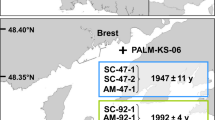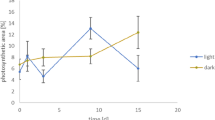Abstract
DURING the past year phototactic behaviour has been studied in a number of motile green algæ and dinoflagellates at this laboratory and at Hopkins Marine Station of Stanford University, California1. These flagellates swim either towards the light or away from it, depending upon their recent past environment in ways that are far from being understood. When any of the organisms examined was transferred to fresh medium, a negative phototaxis resulted immediately. The direction of response was independent of light intensity. When the organisms were kept in the same medium for some time, from hours to days, their reaction became positive, irrespective of the light intensity.
This is a preview of subscription content, access via your institution
Access options
Subscribe to this journal
Receive 51 print issues and online access
$199.00 per year
only $3.90 per issue
Buy this article
- Purchase on Springer Link
- Instant access to full article PDF
Prices may be subject to local taxes which are calculated during checkout
Similar content being viewed by others
References
Halldal, P., Carnegie Inst. of Wash. Year Book No. 55 (1956).
Links, J., thesis, State University, Leyden, Holland.
Needham, D. M., “Adv. in Enzymol.”, 13, 151 (1952).
Author information
Authors and Affiliations
Rights and permissions
About this article
Cite this article
HALLDAL, P. Importance of Calcium and Magnesium Ions in Phototaxis of Motile Green Algæ. Nature 179, 215–216 (1957). https://doi.org/10.1038/179215b0
Issue Date:
DOI: https://doi.org/10.1038/179215b0
This article is cited by
-
A tribute to Per Halldal (1922–1986), a Norwegian photobiologist in Sweden
Photosynthesis Research (2007)
-
Effects of calcium channel blockers and DCMU on motility and the photophobic response of Gyrodinium dorsum
Archives of Microbiology (1989)
-
Chemical and algal relationships in a salinity series of Ethiopian inland waters
Hydrobiologia (1988)
-
Effect of external factors on phototaxis of Chlamydomonas reinhardtii
Archives of Microbiology (1979)
-
Phototaxis
The Botanical Review (1960)
Comments
By submitting a comment you agree to abide by our Terms and Community Guidelines. If you find something abusive or that does not comply with our terms or guidelines please flag it as inappropriate.



